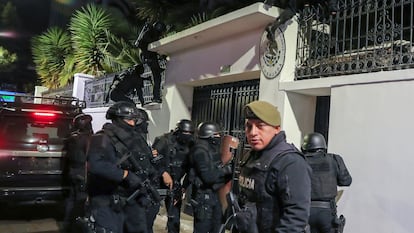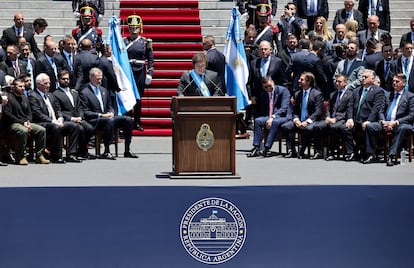Latin America: Hotbed of diplomatic strife
The attack on the Mexican Embassy in Ecuador highlights a turbulent panorama in which diplomatic crises and bilateral tensions threaten regional integration


The scenes are unprecedented. A group of 12 heavily armed agents forced their way into the Mexican Embassy in Quito, treated the diplomatic corps roughly and forcibly removed former Ecuadorian Vice President Jorge Glas, who had been granted political asylum by Mexico. This extreme breach of agreements governing bilateral relations on April 5 has triggered a severe crisis with uncertain repercussions. Mexico has now filed a complaint against Ecuador at the International Court of Justice (ICJ) in The Hague, and seeks a temporary suspension of Ecuador’s membership in the United Nations.
The conflict between Mexican President Andrés Manuel López Obrador and President Daniel Noboa, his right-wing counterpart in Ecuador, is a significant challenge in Latin America, but it’s not the sole source of diplomatic tensions. Venezuela recently passed a law unilaterally annexing the Essequibo region in neighboring Guyana, and President Nicolás Maduro has frequently clashed with almost everyone in Latin America. His controversial handling of the presidential candidate registration process drew criticism even from left-wing leaders like Colombian President Gustavo Petro and Brazilian President Luiz Inácio Lula da Silva. Tensions with Chile escalated, prompting President Gabriel Boric to recall his ambassador from Caracas for consultations. Chilean prosecutors have also accused the Venezuela government of involvement in the murder of an exiled Venezuelan former military officer.
Meanwhile, Argentine President Javier Milei has had more disputes than agreements with fellow Latin American leaders since taking office last December. In Central America, the Daniel Ortega-Rosario Murillo regime is increasingly isolated, while El Salvador’s Nayib Bukele rancorously defends his Draconian security measures. Latin America is awash in diplomatic strife.
The Mexican Embassy assault
The Mexico-Ecuador crisis began well before the world saw Ecuadorian police force Mexico’s top diplomat in Quito to his knees in his own embassy. Ecuadorian police had surrounded the Mexican Embassy on April 5, a few hours after Mexico granted political asylum to former Vice President Jorge Glas. Embassies hold a revered status in international politics and are regarded as sovereign territory. None of the Mexican officials within those walls could have fathomed the events that unfolded until a sudden knock jolted them into an unexpected reality.
Jorge Glas (from the Rafael Correa administration) had been holed up in the Mexican Embassy since last December, and after several acrimonious exchanges between the two countries, Mexico formally granted Glas asylum and requested his safe passage out of the country. Noboa stood by his decision to breach the embassy in an interview with the Australian news outlet SBS on April 15, and said he was open to a friendly chat with López Obrador over tacos and ceviche. But the embassy attack has been unanimously decried in the international community, adding yet another layer of complexity to Latin American foreign policy.
The Essequibo affair

Another recent event that caused alarm in Washington and the United Nations was Nicolás Maduro’s move on Guyana. The dispute over almost 62,000 square miles (160,000 square kilometers) of Essequibo, a mineral-rich jungle region, has been smoldering for over 200 years. Now Maduro has decided to fan the flames of a territorial dispute that has languished at the ICJ since 2018. Most of the people who live in Essequibo speak English and have Guyanese identity documents, which are currently under scrutiny in the ICJ case.
The Essequibo affair has sputtered in Venezuela’s political narrative for decades, but Maduro revived it last year in the run-up to presidential elections on July 28. He launched a referendum to annex the territory, appointed authorities to govern the region, and officially changed Venezuela’s maps to include Essequibo. Troops were mobilized amid frantic communications between the two countries, alarming regional leaders and prompting mediation.
Venezuela, again
For years, decisions and words coming out of Caracas have strained the regional political landscape. The exclusion of the main opposition candidate, María Corina Machado, from the presidential candidate registration process has led to widespread criticism. Expressions of concern and alarm flooded social media, including from left-wing governments. Among the region’s progressive leaders, Chilean President Gabriel Boric has a particularly tense relationship with Maduro.
Chile’s Undersecretary of the Interior, Manuel Monsalve, recently characterized his country’s relationship with Venezuela: “We’ve been trying to set up a good political climate for months. But things have taken a dramatic turn for the worse in the past few weeks.” The latest point of friction was when Venezuelan Foreign Minister Yván Gil called the Tren de Aragua criminal network “a fiction created by the international media.” That led Boric to recall Ambassador Jaime Gazmuri from his post in Venezuela. Before Gazmuri’s 2023 appointment, Chile hadn’t had an ambassador in Caracas since 2018. That episode marked the start of a wider crisis. The abduction and murder of Venezuelan opposition leader Ronald Ojeda with asylum in Chile, had all the markings of a political hit by Caracas, further straining bilateral relations.
Milei’s mouth

During his four months in office, Javier Milei has had more disputes than agreements with other Latin American leaders. The first one started even before he took office, when he was drawing up the invitation list for his December 10 inauguration ceremony. Milei first extended an invitation to former Brazilian President Jair Bolsonaro, with whom he shares a strong ideological bond. He later reluctantly invited Brazilian President Luiz Inácio Lula da Silva, whom he has called “corrupt” and a “communist.” Unsurprisingly, Lula declined the invitation.
More recently, Milei’s acerbic tongue has been unleashed on Colombian President Gustavo Petro and Mexican President Andrés Manuel López Obrador. He called Petro a “terrorist murderer” and López Obrador “ignorant.” Both governments reacted and their respective foreign ministries scrambled to avoid an escalation of insults. That didn’t stop López Obrador from retorting, “I still do not understand how the Argentines, being so intelligent” elected someone like Milei.
After several tense days, Colombia and Argentina issued a joint statement to calm the waters, averting expulsions of diplomats. The relationship between Mexico and Argentina was less contentious, but the flurry of barbs clearly exposed animosity between the leaders of two major Latin American countries.
With reporting by Georgina Zerega, Carolina Mella, Florantonia Singer, Antonia Laborde and Mar Centenera.
Sign up for our weekly newsletter to get more English-language news coverage from EL PAÍS USA Edition
Tu suscripción se está usando en otro dispositivo
¿Quieres añadir otro usuario a tu suscripción?
Si continúas leyendo en este dispositivo, no se podrá leer en el otro.
FlechaTu suscripción se está usando en otro dispositivo y solo puedes acceder a EL PAÍS desde un dispositivo a la vez.
Si quieres compartir tu cuenta, cambia tu suscripción a la modalidad Premium, así podrás añadir otro usuario. Cada uno accederá con su propia cuenta de email, lo que os permitirá personalizar vuestra experiencia en EL PAÍS.
¿Tienes una suscripción de empresa? Accede aquí para contratar más cuentas.
En el caso de no saber quién está usando tu cuenta, te recomendamos cambiar tu contraseña aquí.
Si decides continuar compartiendo tu cuenta, este mensaje se mostrará en tu dispositivo y en el de la otra persona que está usando tu cuenta de forma indefinida, afectando a tu experiencia de lectura. Puedes consultar aquí los términos y condiciones de la suscripción digital.








































